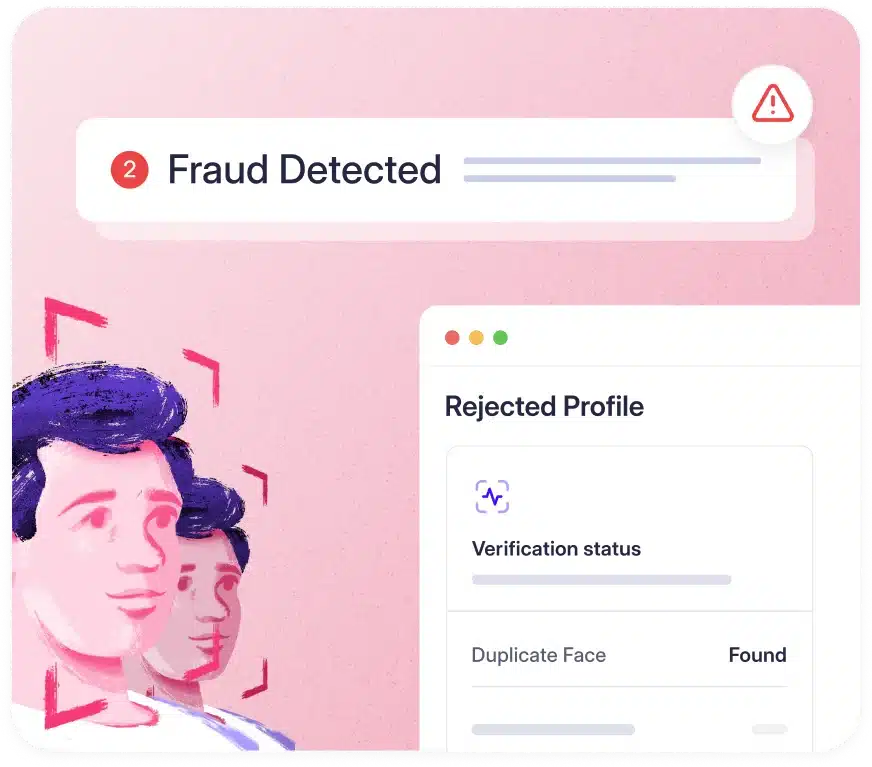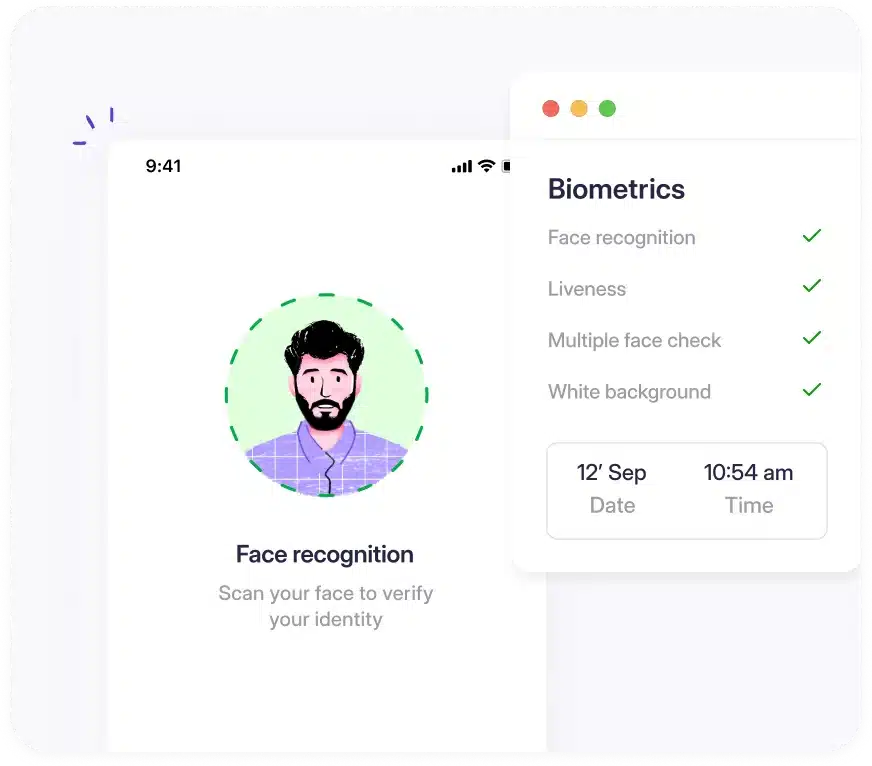Financial fraud is everywhere today.
From a random text claiming you’ve won $50,000 in prize money to an email asking you to wire money based on a fake invoice, you simply cannot escape them.
And what’s worse—fraudsters are getting more innovative with each scam. Research by PwC suggests that 51% of the surveyed financial institutions experienced fraud in just the past 2 years.
So what can you do to be a part of the other half, that somehow managed to stay clear of financial fraud?

For starters, you need to identify what these frauds are.
The following article talks about what financial fraud is, the top types of financial fraud, and how to avoid it.
What is financial fraud?
Financial fraud is the loss of assets and money through unethical, illegal, and deceptive activities by fraudsters and scammers.
Financial fraud can take various forms, such as identity theft, forgeries, embezzlement, and phishing attacks. The repercussions of these frauds go beyond monetary losses, where a loss of business reputation and instability in operations can bring an organization to a standstill.
Top 10 types of financial fraud in business (and ways to prevent them)
To take action against financial fraud, businesses need to understand the various ways fraudsters can scam them.
1. Identity theft
Identity frauds are some of the most common frauds you’ll come across because, they’re comparatively easy to execute, thanks to the technological advances & casual data sharing. Identity theft statistics show that more than a million reports of identity theft were filed in 2022 in the US alone.
Identity theft fraud occurs when a fraudster uses your financial information, such as your brand name, credit card number, bank account number, or bank statements, without permission and uses it to withdraw money or commit other crimes, such as illegal loan sanctioning. Some of the ways criminals use data to commit fraud are:
- Applying for a loan in the individual/business’s name
- Charging items to your credit card or debit card
- Opening an unauthorized bank account
HyperVerge pro tips
In any type of financial fraud, it’s best to follow the ‘prevention is better than cure’ mantra.
✓ Have identity fraud prevention safety nets like identity verification tools that ensure these issues don’t pop up in the first place. You can leverage HyperVerge to prevent fraud using AI and verify the authenticity of documents using central databases recognized by the government.
✓ Advise customers not to share sensitive financial information with people they don’t trust, and look for warning signs that their identity is being compromised. Inform them about the signs of identity theft, such as additions of new loans in their name, irregular card transactions, a credit score drop, etc.
✓ If fraudsters have already used your or your client’s identity to commit financial crime, immediately take the following steps:
- Freeze the account and get bank statements.
- File a police report for identity theft.
- Inform the impacted party or the financial institution (banks/ insurance companies)
- Change account passwords for the bank account.
2. Advance fee fraud
Advance fee fraud is a type of financial crime where the scammer entices the victims to pay an upfront fee with the false promise of getting a product or benefit later. Some of the most common types of advance fee fraud are lottery scams, inheritance scams, loan scams, and investment opportunity scams.
While this has been a common practice for years, the rise of advance fee fraud has exponentially increased with the advent of messaging apps and digital communication channels. Fraudsters target a range of victims and adopt strategies to scam them.
HyperVerge pro tips
Advise your customers to:
✓ Always question high-risk offers and situations. If someone is promising a large sum of money in a short time, do your due research.
✓ Conduct verification checks to see the legitimacy of an investment or employment. Take advice from independent sources if needed and perform background checks.
✓ Look for red flags, like when scammers create a sense of urgency, ask for confidentiality, ask for up-front payments, and share an offer that is too good to be true. Avoid businesses or individuals that don’t have addresses and operate out of PO boxes.
✓ Never share their social security number and other sensitive brand information with strangers or even family members who they don’t trust to prevent social security identity theft.
3. Fraudulent charities
Yes, fraudsters don’t leave philanthropy alone either. Brands that undertake charitable work as part of their CSR need to look out for fraudulent charities that raise donation money as part of scams. Research even suggests that the majority of the time, it is the employees, trustees, and staff of charities who perpetrate these frauds.
Fraudsters go as far as creating fake charities and the kind with which you’ve been involved before to gain your trust. They’re especially prevalent during high-profile disasters and international events.
HyperVerge pro tips
✓ The warning signs can include asking for cash, gift cards, wire transfers, or crypto donations instead of accepting cheques or credit cards. Scammers usually pressure you to donate and claim you’ve also donated previously.
✓ Only transact with charities you personally know or have a reputation in society. Beware of scams, especially during a natural disaster.
✓ Check if they have an online presence and that their site is secure. You can also use the Federal Trade Commission resources to track the history of the said charity.
✓ While there isn’t a way to get back your money after getting scammed, you can report financial fraud so there is a record with the authorities.
✓ Nonprofits should vet tools for enterprise-grade security (like SOC 2 certification) to prevent donor data breaches and maintain trust.
4. Payment fraud
Just like identity theft, payment fraud occurs when someone uses your credit card to make payments for personal gain. This is highly prevalent in the eCommerce industry and can negatively impact individuals and businesses. Hackers and cybercriminals often use instant messaging tools, email, phone calls, and spammy links to steal money or personal data.
Individuals face significant losses, while businesses have to spend their time and resources getting to the root of these scams. They have to settle the dispute, pay investigation and chargeback fees, and invest in human personnel to settle the disputes.
HyperVerge pro tips
✓ Transaction monitoring is necessary to check transactions for irregular activities and prevent payment fraud. You can use a tool to set up alerts for unusual transaction patterns and identify extremely expensive purchases happening in a short time. This can help notify businesses and individuals if cybercriminals have compromised their accounts.
✓ Encourage the use of strong passwords. Individuals who keep easily hackable passwords without multi-factor authentication are more likely to become victims of payment fraud.
✓ Have fraud detection tools in place, such as address verification or IP geolocation, to protect against chargeback and payment fraud.
Detect advanced financial fraud using HyperVerge’s identity verification solution
Learn more5. Investment fraud
Investment fraud involves techniques and false information & promises for a potential profit of their investment. Scammers fabricate and underplay the risks and exaggerate the supposed benefits of the investment to get you on board.
One of the most common types of investment fraud is Ponzi schemes, in which fraudsters collect payments from new investors to pay off earlier investors. They promise to invest the money to earn extremely high profits with little risk and later disappear with your money.
Scammers go to extensive lengths for Ponzi schemes to look legitimate. They build websites, fabricate documents, and get legitimate people on board to garner trust, making it extremely difficult for victims to have a sense of doubt.
HyperVerge pro tips
✓ When there’s a large sum of money involved, it’s almost too good to be true. Question the investment, ask for every detail, and go through every step of the procedure.
✓ Ensure caution when you receive cold calls from companies and organizations you’ve never heard of. Investment fraud calls lack credibility and reputation. Do your due research and cross-check the legitimacy of the investment.
✓ Involve trusted lawyers and ask for legal documentation for any proposal to avoid investment fraud or a Ponzi scheme.
✓ Cross-check with regulatory bodies like the SEC in the USA or FCA in the UK if the organization is regulated.
6. Payroll fraud
Payroll fraud occurs when an individual illegally gains funds from an organization’s payroll processing system for their benefit. Employees and employers both can have the potential to commit payroll fraud that involves timesheet fraud, ghost payroll, third-party payroll, commission schemes, etc.
The employees can commit this fraud by adding extra work hours when they haven’t worked or increasing the compensation rate by system manipulation. The employers can withhold the salaries for their benefit. Both scenarios involve deceit and stealing from the organization.
HyperVerge pro tips
✓ Some warning signs include unfamiliar charges to payroll records, inconsistencies in outgoing payments, and missing records.
✓ Practice good payroll hygiene. Conduct frequent internal and external audits to keep track of employee behavior, keep ahead of irregular activities, verify records, and get a general oversight.
✓ Adopt advanced attendance management tools to avoid timesheet fraud. Choose tools with face recognition systems and AI to recognize legitimate employees and record genuine work hours.
✓ Revisit your payroll access based on employee needs. Controlled access to employees ensures fewer opportunities for committing financial scams.
7. Phishing scams
Phishing is a social engineering practice in which identity theft occurs without the victim’s knowledge. Individuals use deceptive tactics to scam others into sharing sensitive information through fraudulent emails or messages. The hackers pose as bosses, banks, or colleagues and ask for confidential details like login credentials or a sum of money.
Phishing has become one of the most common types of financial fraud. In 2022, more than 300,000 phishing victims in the US lost more than $52 million.
HyperVerge pro tips
✓ Always check the URL before replying to the sender. Is it secure? Make sure it uses https:// protocols. The ‘s’ in ‘https’ means the URL is secure. If it looks suspicious, do not respond and report it to the management immediately.
✓ Use a secure web browser and add extra security measures, such as anti-phishing and account security tools and plug-ins, to help prevent unauthorized third-party activity. Also, train employees on identifying phishing emails and messages to defend against them.
✓ Avoid clicking on popups as hackers, cybercriminals, and attackers trick users into opening a malicious site or downloading malware.
8. Card-not-present fraud
The rise of online shopping has birthed a new type of credit card fraud called card-not-present. A fraudulent actor uses stolen credit card information to make purchases over the phone or online without physically presenting the card.
Fraudsters gain access to this information through data breaches or social engineering tactics like phishing attacks and use it to make purchases.
Merchants are usually responsible for CNP frauds, as they need to ensure secure checkouts or else face chargebacks for unauthorized purchases. The user usually discovers these types of attacks after it’s too late.
HyperVerge pro tips
✓ Improve the process of consumer identity verification to detect suspicious activity. You can leverage tools like HyperVerge to verify customer identities through government-issued and address verification to ensure rightful purchases.
✓ Have multi-factor or two-factor authentication to protect card information and prevent credit card fraud. This will add a security layer at checkouts, and the customer will be notified before any authorized transaction occurs.
✓ Embrace tokenization methods to secure sensitive payment information. Tokenization replaces the cardholder’s Primary Account Number (PAN) with a unique identifier called a token. It minimizes the risk of unauthorized access to card information during a data breach.
9. Account takeover
Another aspect of identity theft is account takeover fraud, in which hackers gain access to your online financial accounts. 65% of US individuals who were victims of identity theft were also victims of account takeover.
Inevitably, account takeovers result from identity thefts as fraudulent actors can easily pose as the account holder and get access to account data.
Once they access the account, they change the password and start operating it for their benefit. This leads to the unauthorized transfer of funds, making expensive purchases, and opening new accounts to credit cards under the victim’s name.
HyperVerge pro tips
✓ Change all the passwords if your account is compromised. Use stronger passwords that combine capital letters, numbers, and symbols to make it harder to crack and avoid credit card fraud.
✓ Enable two-factor authentication for all your accounts to ensure higher security and fewer chances of takeover.
✓ Monitor your emails and other communication channels regularly to prevent account takeovers. Assess your text messages and social media for phishing attempts or requests for sensitive information.
10. Deepfake fraud
Deepfakes are media, like images or videos, altered by AI to deceive. While tools like Photoshop and video tampering are not new, deepfake tools make it almost impossible to distinguish the real from the fake. Machine learning techniques make deepfakes seem legitimate enough for victims to fall prey to the fraud.
HyperVerge pro tips
✓ Only advanced AI tools can fight advanced AI-related fraud. Ensure that you have the right face verification, identity verification, and biometrics in place to make it impossible for deepfake fraud to occur.

✓ Use advanced threat detection tools to identify patterns such as lack of light in the eyes, mismatch in facial expressions, or absent or excessive blinking that give out a hint that the photo or image is deep fake content.
✓ Train your team to identify deepfakes and how to check for warning signs. Ask them to question every caller, look out for inconsistencies, and think critically when they’re talking to other parties.
Prevent financial fraud with HyperVerge
There you have it—the most common financial frauds that plague our society today. While we cannot completely avoid them, artificial intelligence and machine learning can help reduce their impact and strengthen our security measures.
HyperVerge provides an end-to-end AI-powered identity verification solution that helps identify identity-related fraud and deepfakes. HyperVerge has worked with reputable clients like Angel One, L&T Finance, and HomeCredit to leverage solutions for photo verification, document analysis, and transaction monitoring to detect fraud. We’ve verified over 800 million identities with a 95% auto-approval rate. Book a demo to learn more about how HyperVerge can fit into your fraud prevention measures.
Frequently Asked Questions
1. What are the most common types of financial fraud?
The most common types of financial fraud include identity theft, account takeover, investment fraud, payment fraud, and phishing scams.
2. How do you detect financial fraud in banks & financial institutions?
You can use AI-powered fraud detection tools in banking, like face de-duplication technology, to identify advanced and sophisticated financial crimes. These tools use advanced algorithms to monitor transactions and flag suspicious activities. They help you prevent the scale of financial scams and mitigate their damages.
3. How to avoid identity theft?
Have strong identity verification tools in place. Software like HyperVerge helps you with KYC checks and authenticate users with face and biometric verification.





















